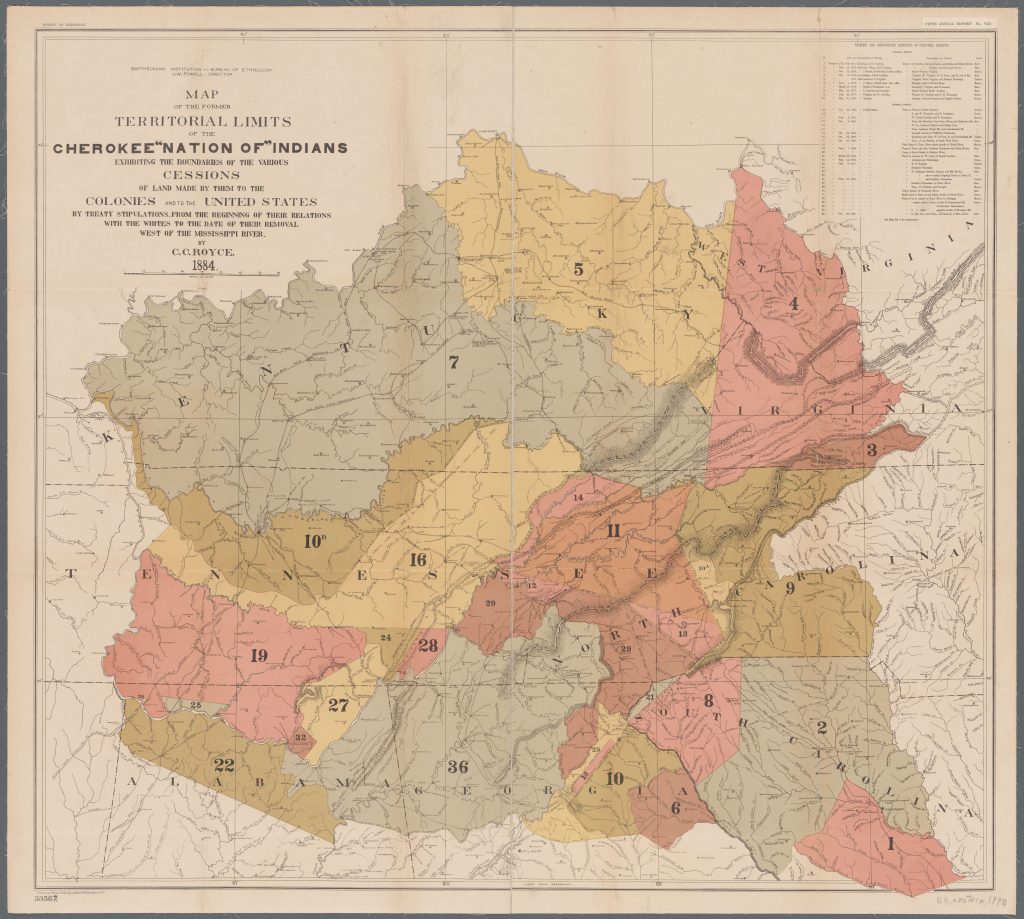Cherokee
The Cherokee are one of the indigenous peoples of the Southeastern Woodlands of the United States. Before the 18th century, they were concentrated in their homelands, in towns along river valleys of what is now southwestern North Carolina, southeastern Tennessee, southwestern Virginia, parts of western South Carolina, northern Georgia, and northeastern Alabama.
Much of what is known about pre-18th century Native American cultures has come from records of Spanish expeditions. The earliest ones of the mid-16th century encountered peoples of the Mississippian culture era, who were ancestral to tribes that emerged in the Southeast, such as the Cherokee, Muscogee, Cheraw, and Catawba. Specifically, in 1540-41, a Spanish expedition led by Hernando de Soto passed through present-day South Carolina, proceeding into western North Carolina and what is considered Cherokee country. The Spanish recorded a Chalaque people as living around the Keowee River, where western North Carolina, South Carolina, and northeastern Georgia meet. The Cherokee consider this area to be part of their homeland, which extended into southeastern Tennessee.

Anthropologists and historians have two main theories of Cherokee origins. One is that the Cherokee, an Iroquoian-speaking people, are relative latecomers to Southern Appalachia, who may have migrated in late prehistoric times from northern areas around the Great Lakes. This has been the traditional territory of the Haudenosaunee nations and other Iroquoian-speaking peoples. Another theory is that the Cherokee had been in the Southeast for thousands of years and that proto-Iroquoians developed there. Other Iroquoian-speaking tribes in the Southeast were the Tuscarora people of the Carolinas and the Meherrin and Nottaway of Virginia.
The Cherokee language is part of the Iroquoian language group. In the 19th century, James Mooney, an early American ethnographer, recorded one oral tradition that told of the tribe having migrated south in ancient times from the Great Lakes region, where other Iroquoian peoples were based. However, anthropologist Thomas R. Whyte, writing in 2007, dated the split among the peoples as occurring earlier. He believes that the origin of the proto-Iroquoian language was likely the Appalachian region, and the split between Northern and Southern Iroquoian languages began 4,000 years ago.
By the 19th century, White American settlers had classified the Cherokee of the Southeast as one of the “Five Civilized Tribes” in the region. They were agrarian, lived in permanent villages, and had begun to adopt some of the cultural and technological practices of the white settlers. They also developed their own writing system.
Today, three Cherokee tribes are federally recognized: the United Keetoowah Band of Cherokee Indians (UKB) in Oklahoma, the Cherokee Nation (CN) in Oklahoma, and the Eastern Band of Cherokee Indians (EBCI) in North Carolina.
The Cherokee Nation has more than 300,000 tribal members, making it the largest of the 574 federally recognized tribes in the United States. In addition, numerous groups claim Cherokee lineage, and some of these are state-recognized. A total of more than 819,000 people are estimated to have identified as having Cherokee ancestry on the U.S. census; most are not enrolled members of any tribe.
Of the three federally recognized Cherokee tribes, the Cherokee Nation and the UKB have headquarters in Tahlequah, Oklahoma, and most of their members live in the state. The UKB are mostly descendants of “Old Settlers”, also called Western Cherokee: those who migrated from the Southeast to Arkansas and Oklahoma in about 1817, prior to Indian removal. They are related to the Cherokee who were later forcibly relocated there in the 1830s under the Indian Removal Act. The Eastern Band of Cherokee Indians is located on land known as the Qualla Boundary in western North Carolina. They are mostly descendants of ancestors who had resisted or avoided relocation, remaining in the area. Because they gave up tribal membership at the time, they became state and US citizens. In the late 19th century, they reorganized as a federally recognized tribe.
Cherokee Tribe History (YouTube)
References
Information on the Cherokee from Wikimedia Foundation licensed under CC-BY-SA 4.0

